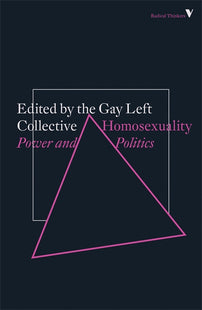Capitalism and the Organisation of Sex
An extract from Homosexuality: Power and Politics by The Gay Left Collective - an anthology combining the very best of their work from 1975 and 1980, exploring masculinity and workplace organising, counterculture and disco, the survivals of victorian morality and the onset of the HIV/AIDS crisis.

This extract comes from the essay 'Capitalism and the Organisation of Sex' by gay activist and historian Jeffrey Weeks from Homosexuality: Power and Politics by The Gay Left Collective. Formed after the evaporation of the Gay Liberation Front (GLF) and the Gay Marxist Group, The Gay Left Collective published every six months in London between the years 1975 and 1980 with the goal of contributing to a Marxist analysis of homosexual oppression and encouraging an understanding of the links between the struggle against sexual oppression and the struggle for socialism.
Homosexuality is a key title in our Radical Thinkers series, which are beautifully designed important works of theory and philosophy, including Walter Benjamin, Judith Butler, Theodor Adorno, and many more. Take a look at our titles here.
Capitalism and the Organisation of Sex
In Western capitalist countries, sex is securely established on His (and it is “His”) throne, Master of all He surveys. Moralists rant about its excesses, revealing in every bead of sweat their obsession with it. Liberals, rejoicing in the “ending” of ancient hypocrisies, revel in its pleasures. Sex, far from being denied by capitalism, has been exalted. Sex oils the wheels of advertising. Endless page threes sell tawdry newspapers. Sex envy is the beginning and end of personal relations. Sex has launched a thousand ships and ruined a million families. Sex has become the truth of our being, the key to our deepest secrets.
Socialists are faced with a complex problem. The sexual radical movements gained their initial impetus from the conviction that the “system” dominated by hypocrisy/puritanism denied various forms of sexual expression: female sexuality and homosexuality in particular. This in turn was theoretically related to the “need” for capitalist society to repress certain types of sexuality to secure its even functioning. The problem is to square this conviction with the active promotion of sexuality, indeed the explosive emergence of sexuality, in capitalist society over the past generation. Theories such as Marcuse’s “repressive desublimation” have in fact proved totally inadequate as explanations. Instead we have to look at the forms of sexuality which have emerged as central to its capitalist organisation: the “sexually alluring”, “liberated” woman who graces Cosmopolitan, the swinging, self-confident affluent homosexual male who lives in the pages of The Advocate. What we are witnessing is the creation of new sexual types which are potentially as limiting as the old stereotypes (the sexless “lady” of some nineteenth-century textbooks, the degenerate pervert of twentieth-century psychiatrists). They are models which are based on confirming sex just as the old ones denied it, but both reveal a central factor in modern cultures. What has happened is that a tendency that has always been there in bourgeois cultures has assumed a new strategic position, and we have become a sex-positive culture of sorts. But, and it is a major but, this positiveness is only being applied to certain types of behaviour, in certain ways. And in asking why this is so we might find an answer to a wider but more mysterious question: why capitalism and sexuality are so inextricably linked.
For most writers in the socialist tradition the relationship between capitalism and sexual oppression, although seen as complex, has nevertheless been treated as unproblematic. Engels wrote that true sex life had been distorted by commodity production but would flourish on a higher plane under socialism: “Monogamy, instead of collapsing, (will) at last become a reality”. Contained in this (apart from an implicit heterosexual bias) are two concepts which have actually been a bar to any proper socialist evaluation of sexual oppression. The first is an assumption that sex is a natural force with direct effects on the individual and the body politic. The second is the assumption that this sexuality is channelled or directed straight forwardly and with intentionality through the nuclear family, in the interests of capitalism.
A number of assumptions have classically been made about the nature of sexuality, assumptions current both in traditionalist and left thought (and particularly evident in the writings of the Freudian left: Reich, Fromm, Marcuse). They also have the undoubted strength of appearing as commonsensical: in this view sex is conceived of as an overpowering, instinctual force, whose characteristics are built into the biology of the human animal, which shapes human institutions and whose will must find an outlet, either in the form of direct sexual expression or, if blocked, in the form of perversion or neuroses. Krafft Ebing expressed an orthodox view in the late nineteenth-century when he described sex as a “natural instinct” which “with all-conquering force and might demands fulfilment”. The clear supposition here is that the sex drive is basically male in character, with the female perceived as a passive receptacle. More sophisticated versions of what William Gagnon and John Simon have termed the “drive reduction” model recur in twentieth-century thought. It is ambivalently there in part of Freud’s work, though the careful distinction he draws between “instinct” and “drive” has often been lost, both by commentators and translators. It is unambiguously present in the writings of many of his self-defined followers. As G. R. Taylor wrote in his neo-Freudian interpretation of Sex in History:
The history of civilisation is a history of a long warfare between the dangerous and powerful forces of the id, and the various systems of taboos and inhibitions which man has erected to control them. [1]
Here we have a clear notion of a “basic biological mandate” that presses on, and so must be firmly controlled by the cultural and social matrix. What is peculiar about this model is that it has been adopted by marxists who in other regards have firmly rejected the notion of “natural man”. With regard to homosexuality, the instinctual model has either seen it as a more or less pathological deviation, a failure of socially necessary repression, or as the effect of the morally restrictive organisation of sexual morality, which is how it appears in the works of Wilhelm Reich; or more romantically, but nevertheless still ahistorically, as the “great refusal” of sexual normality, which is how Marcuse seems to present it.
Against this William Gagnon and John Simon have argued in their book Sexual Conduct that sexuality is subject to “socio-cultural moulding to a degree surpassed by few other forms of human behaviour”, and it is in using this insight that socialists can most fruitfully explore the question of sexual oppression. A number of recent writers have taken up elements of this notion, and together they have posed formidable challenges to our received notions of sexuality.
The first consequence is a rejection of sex as an autonomous realm, sexuality as a natural force with specific effects, a rebellious energy which is controlled by the “social”. In the work of Gagnon and Simon it seems to be suggested that nothing is intrinsically sexual, or rather that anything can be sexualised. In Jacques Lacan’s return to Freud, desire is created as a consequence of the child’s entry into patriarchal meanings at the Oedipal moment. In the recent work of Michel Foucault, The History of Sexuality, sexuality is seen as a historical apparatus, and “sex”, far from having a life and history of its own, is a “complex idea that was formed within the deployment of sexuality”.
Foucault’s work is particularly relevant here because he quite clearly sees the notion of sexuality as itself an ideological construct, a product of particular historical circumstances. The notion of “sexuality” organises and unifies the various possibilities for pleasure of the body: it plays upon “bodies, organs, somatic localisations, functions, anatamo-physiological systems, sensations, and pleasures” [2] which have no intrinsic unity or “laws” of their own. In other words, our culture has developed a notion of sexuality linked to reproduction and genitality and to “deviations” from these, which have denied us (openly at least) the full enjoyment of the bodily pleasures that are potentially available to us.
The second consequence which derives from questioning the existence of a self-evident biological sexuality is that we have to question the traditional notions of “repression” of sexuality. Far from society repressing (or conversely liberating) sexuality, its main tendency lies in organising and inventing forms of sexual definition, categorisation, and hence regulation. Gagnon and Simon have written:
To earlier societies it may not have been a need to constrain severely the powerful sexual impulse in order to maintain social stability or limit inherently anti-social force, but rather a matter of having to invent an importance for sexuality. [3]
If this is indeed the case, we must begin to think much more in terms of the various forms of social definition of sexuality and their social conditions of existence rather than try to speak in terms of “capitalism” oppressing “sexuality” as if there could be a simple relationship between the two. A major insight which both the theoretical tradition represented by Gagnon and Simon and the school of thought represented by Michel Foucault have in common is a recognition that a major way in which sexuality is regulated is through the process of categorisation and the imposition of a grid of definition upon the various possibilities of the body and the various forms of expression that “sex” can take. This in turn should direct our attention to the various institutions and social practices which perform this role of organisation, regulation, categorisation: various forms of the family, but also legal regulation, medical practices, psychiatric institutions and so on, all of which can be seen as products of the capitalist organisation of society, but all of which at the same time have a relative autonomy within the capitalist system and from the ruling class. The infinite possibilities of the human child at birth are gradually narrowed, organised and controlled as the s/he becomes subjected to the class- and gender-defined social order.
[book-strip index="1" style="buy"]References
[1] Gordon Rattray Taylor, Sex in History, London, 1953.
[2] Michel Foucault, A History of Sexuality, vol. 1, London, 1979.
[3] William Gagnon and John H. Simon, Sexual Conduct, London, 1973.
